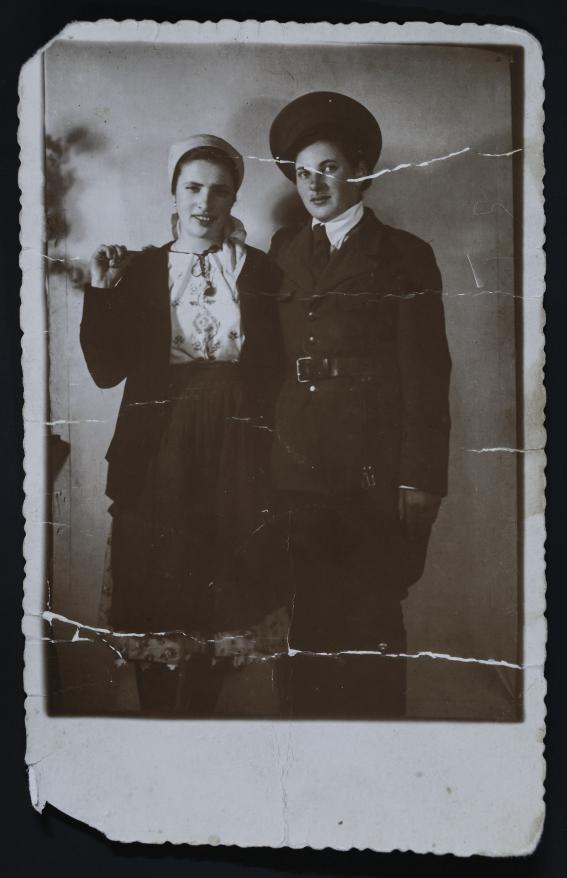

The Jewish holiday of Purim is celebrated every year on the 14th day of the Hebrew month of Adar (around February/March). The holiday celebrates the salvation of the Jewish people during the time of Ancient Persia from the evil Haman who plotted to murder all of the Jews, according to the Biblical Book of Esther. The holiday is celebrated by reading the Book of Esther, which recounts the miracle of Purim, giving small gifts of food to one's neighbors (mishloah manot), donating to the poor and celebrating over a festive meal. Children and often adults also celebrate by dressing in costume.
During the Purim holiday in 1942, the Goldstein family gathered for a traditional Purim feast in their home in the town of Érmihályfalva (Hungary). The neighbor's children entered singing festive Purim songs and received mishloah manot; the Goldstein children were dressed in carnival costumes to celebrate the joy of the holiday. This photograph captures Miriam Goldstein (on the left) dressed as a Roma girl and her sister Sara (on the right) dressed as a Romanian soldier. Two years later, the German army occupied Hungary. The Goldstein family was deported to the Oradea ghetto and a month later to Auschwitz, where the parents, Sheva and Yoel, and their three young children, Avraham, Aharon and Chaya, were murdered. Although Miriam, Sara and their other sister Beila were moved from one labor camp to another, they managed to stay together. Their mutual support fortified their determination to remain alive. The conditions in the labor camps did not permit the observance of tradition as was customary in their childhood home, but the sisters continued to pray from memory. They were finally lliberated in the Salzwedel concentration camp in April 1945; a year later, Sara and Miriam immigrated to Eretz Israel.
During a collection day for Yad Vashem's "Gathering the Fragments" national campaign that took place in the Ramat Tamir neighborhood in Jerusalem, Miriam and Sara nee Goldstein donated precious family photographs documenting the joy of a Jewish family celebrating Purim on the eve of the Shoah.
Yad Vashem has been gathering Holocaust-era documentation and artifacts like these in Israel and around the world since its inception. Despite the efforts made to gather these vital effects, many millions more remain scattered across the globe, in the private possession of Holocaust survivors and their families. Therefore, in 2011 Yad Vashem launched its "Gathering the Fragments" campaign to rescue personal Holocaust-era items. So far some 10,800 survivors and family members have donated some 241,000 items, including 93,000 photographs, to Yad Vashem for safekeeping.
For more information on "Gathering the Fragments" campaign, or if you are interested in donating, please contact: collect@yadvashem.org.il









